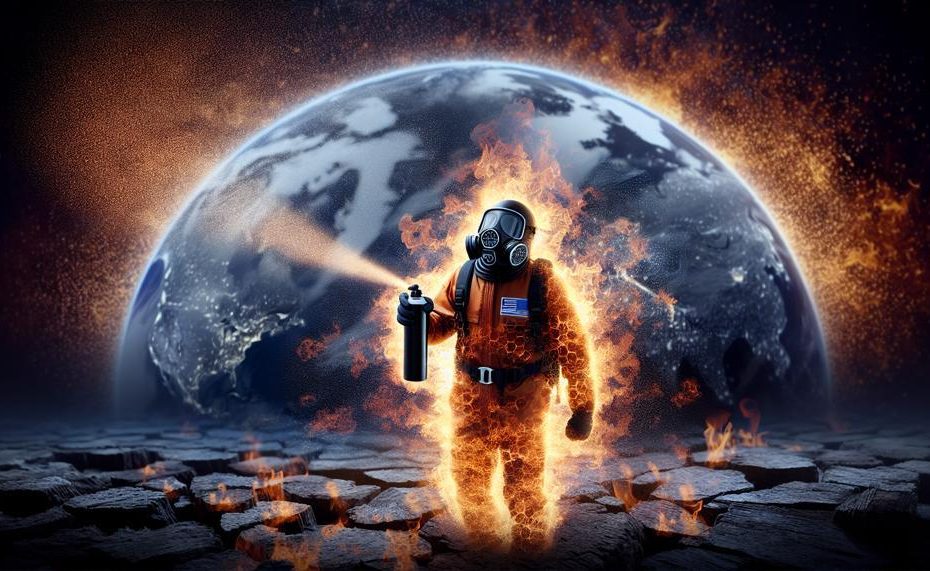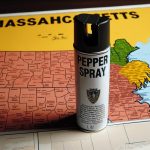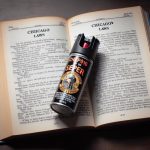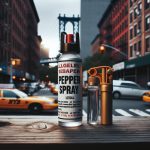Pepper spray – a handy tool for self-defense, but a nightmare if it ends up on your skin. The burning sensation can be overwhelming and the pain unbearable. If you’ve found yourself in this situation, don’t panic.
In this blog post, we’ll guide you through the essential steps to treat pepper spray burns on skin with expert tips and advice.
So, how do you stop pepper spray burn on skin?
Here are some things you can try if you get pepper spray on your skin:
- Wash with soap and water: Use a cleansing solution like hand soap, shampoo, or dish soap. Warm water is better at removing capsaicin, but it may increase discomfort.
- Soak with cool water: Repeated cool water soaks may help relieve burning sensation or irritation.
- Rinse with vinegar: Rinse the affected area with a solution of equal parts water and vinegar for several minutes to help neutralize the effects of the pepper spray.
- Apply milk: Apply a towel soaked in milk to your skin for a few minutes or as long as it takes to bring relief. The fat stops the compounds in the spray from engaging the nerve endings in your body.
- Avoid lotions and creams: Don’t apply any soothing cream or lotion on the skin of the affected area. It may lock the capsaicin in the skin that will not let the skin irritation stop.
Whether you accidentally sprayed yourself or encountered pepper spray during a protest or attack, our guide will provide you with all the necessary information to effectively treat and heal your pepper spray burns.
Don’t let this painful experience linger any longer – read on to learn how to properly care for your skin.
Contents
Understanding Pepper Spray
Pepper spray contains active ingredients that can cause intense pain, redness, and swelling upon contact with the skin, eyes, or respiratory system.
These irritants, oleoresin capsicum (OC) and capsaicin, can also lead to temporary respiratory distress, eye injuries such as corneal abrasions or temporary blindness, skin irritation, and allergic reactions if used improperly.
| Active Ingredients | Effects | Preventative Measures |
| Oleoresin Capsicum (OC) | Intense pain, redness, and swelling upon contact with the skin, eyes, or respiratory system. | – Use with caution – Seek immediate medical attention if symptoms persist or worsen |
| Capsaicin | Painful burns on the skin. | – Blink rapidly and remove contaminated clothing – Rinse affected area with cool water or milk – Use mild detergent or baby shampoo to remove oily residue – Seek medical attention if necessary |
The effects of pepper spray can last for at least 30 minutes depending on the strength and amount used. However, seeking proper medical treatment can alleviate these effects without causing any long-term complications in most cases.
It is essential to handle pepper spray carefully and seek medical attention if necessary to avoid further harm. It is also crucial to consider other self-defense options for safety.
Immediate Reactions to Pepper Spray Exposure
Pepper spray exposure on the skin can lead to a variety of immediate reactions, including irritation, pain, redness, and swelling. The active ingredients in pepper spray, namely oleoresin capsicum (OC) and capsaicin, can cause intense discomfort and burning sensations when they come into contact with the skin. In some cases, the skin may also develop rashes, blisters, or burns as a result.
These chemical irritants can also affect the eyes and mucus membranes, leading to symptoms such as watery eyes, difficulty opening the eyes, and sensitivity to light. These reactions can be quite uncomfortable and make it difficult to keep the eyes open.
Table: Immediate Reactions to Pepper Spray Exposure
| Signs and Symptoms | Description |
| Irritation of the eyes, skin, and mucus membranes | This is a common immediate reaction to pepper spray exposure on the skin. The active ingredients in pepper spray can cause intense discomfort and burning sensations. In some cases, it may also lead to rashes or burns on contact with the skin. |
| Pain, redness, watery eyes, difficulty opening the eyes, and sensitivity to light in the eyes | These symptoms are caused by the irritants in pepper spray that affect the eyes. They may make it difficult to keep the eyes open or see clearly. |
| Pain, redness, swelling, and itching in the skin | When pepper spray comes into contact with the skin, it can cause intense pain and irritation. The affected area may also become red and swollen. |
| Swelling in the eyes, nose, and throat | In some cases of pepper spray exposure on the skin, there may be swelling in the eyes, nose, and throat. This can make it difficult to breathe and cause chest tightness. |
| Coughing, difficulty breathing, and shortness of breath | Inhaling pepper spray can cause severe symptoms such as coughing, difficulty breathing, and shortness of breath. These reactions may require medical attention. |
| Rashes, blisters, or burns on contact with the skin | Depending on the strength and amount of pepper spray used, the skin may develop rashes, blisters, or burns on contact. These can be painful and may require medical treatment. |
| Scratches to the eyeball, or corneal abrasions, in about 0% of cases | In rare cases, pepper spray exposure on the skin may lead to scratches or abrasions on the eyeball. This can cause temporary vision impairment and should be evaluated by a doctor. |
| Chest tightness, swelling and burning sensations in the eyes, nose and throat | These symptoms are more common when pepper spray is inhaled, but they can also occur if it comes into contact with the skin. They can be dangerous and require medical attention. |
First Aid for Pepper Spray Exposure
Whether you accidentally come into contact with pepper spray or someone intentionally sprays it on you, it’s crucial to take immediate action to minimize its effects. Here are the necessary steps that you should take:
- Seek out a well-ventilated area: The first step in managing pepper spray exposure is to move away from the source and into an area with fresh air. This will help reduce the effects of the spray and make it easier for you to breathe.
- Keep your eyes open: Although it may be challenging, try to keep your eyes open during this time. Doing so will help flush out the spray and prevent further irritation.
- Avoid rubbing your eyes: As tempting as it may be, do not rub your eyes as this can spread the pepper spray and make the burning sensation even worse.
- Remove any contaminated clothing: If you were sprayed on your clothes, remove them immediately and wash them separately from other clothing to avoid spreading the spray.
- Do not use oil-based substances: It’s essential not to use any oil-based substances or lotions on your skin as they can trap the pepper spray and prolong its effects.
- Rinse with water or an antacid solution: To alleviate the burning sensation on your skin, flush the affected area with water or a solution of water and liquid antacid.
- Consider using dairy products: Dairy products contain casein, a protein that can help neutralize capsaicin, the active ingredient in pepper spray. Drinking milk or applying it directly to the affected area can provide relief.
- Take a cool shower: Taking a cool shower can help rinse off any remaining pepper spray on your body and provide relief from its effects.
- Seek medical attention if necessary: If you have pre-existing respiratory conditions or if symptoms persist, seek medical attention immediately to ensure proper treatment and recovery.
- Avoid wearing contact lenses: After being exposed to pepper spray, avoid wearing contact lenses as it can cause further irritation to your eyes.
Step-by-step Guide to Remove Pepper Spray from Skin
Step 1: Rinse with Lukewarm Water
The first step in effectively removing pepper spray from your skin is to rinse the affected area with lukewarm water. This will help to wash away the pepper spray particles and soothe the burning sensation.
Use gentle pressure while rinsing and avoid using hot water, as it can worsen the effects.
Step 2: Apply a Cold Compress
After rinsing, apply a cold compress to the affected area. This will help to reduce inflammation and numb the area, making the burning sensation less intense.
You can use a bag of ice or a cold towel for this purpose.
Step 3: Use a Dawn Detergent Solution
Mix one part Dawn detergent with three parts cold water and apply it to the affected area.
This solution can effectively break down the oils in the pepper spray, making it easier to remove from your skin. Repeat this step around seven times or until the effects are completely gone.
Step 4: Apply Liquid Antacid
Another option for neutralizing the effects of pepper spray on skin is to apply liquid antacid directly to the affected area.
Allow it to sit for a couple of minutes before rinsing off with lukewarm water.
Step 5: Use Honey or Baking Soda
Honey and baking soda have anti-inflammatory properties that can help to soothe the burning sensation caused by pepper spray.
Simply apply a small amount onto the affected area and leave it on for a few minutes before rinsing off.
Remember, do not rub your eyes or any other areas that may have come in contact with pepper spray.
Seek medical attention if needed and avoid wearing contact lenses immediately after exposure.
Removing pepper spray from your skin can be a painful experience, but following these steps can help alleviate the discomfort.
Remember, always seek medical attention if needed and avoid rubbing your eyes or any other affected areas.
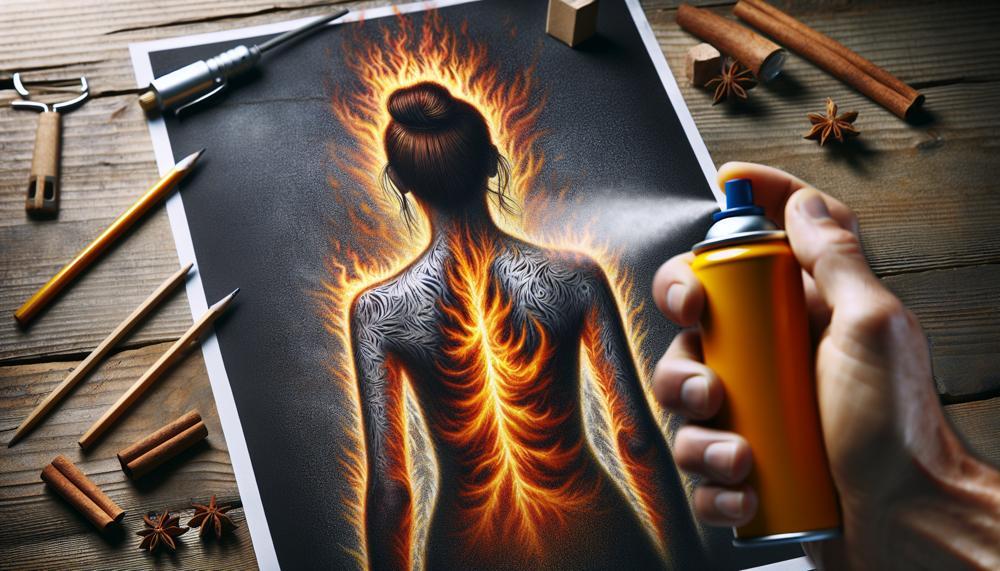
Preventing Future Exposure
Pepper spray is a potent tool for self-defense, but proper handling is crucial in preventing potential harm. Educating yourself about pepper spray and its effects is the first step in minimizing the risk of experiencing pepper spray burn on your skin. Understanding that it contains capsaicin, a chemical derived from chili peppers, and its purpose is to temporarily disable an attacker, giving you time to escape.
If you accidentally expose yourself to pepper spray, immediate action is necessary to minimize its effects. Find a well-ventilated area and try to keep your eyes open and blink frequently. Rubbing your eyes can worsen the burning sensation, so avoid doing so. Remove any contaminated clothing and refrain from using oil-based substances, as they can trap the pepper spray particles on your skin.
Knowing effective treatment methods for pepper spray exposure is essential. Flushing the affected area with lukewarm water, using antacid solutions, applying dairy products or lemon juice, or taking a shower can help reduce the burning sensation. However, it’s a common misconception that vinegar can neutralize pepper spray’s effects.
Recovery time from pepper spray exposure can vary, lasting anywhere from 30 minutes to a few hours. During this time, it’s important to avoid wearing contact lenses and consult an eye care professional if discomfort persists.
Follow these tips to minimize the risk of experiencing pepper spray burn on your skin and effectively handle any potential exposure. Always exercise caution when handling pepper spray and seek medical attention if necessary.
Also Read: Can You Be Immune To Pepper Spray?
Conclusion
In conclusion, while pepper spray can serve as a valuable tool for self-defense, it can also leave a burning sensation on your skin. But fear not, as this blog post has provided a comprehensive guide on how to effectively treat pepper spray burns with expert tips and advice.
From understanding the effects of pepper spray on skin to discussing first aid techniques and natural remedies, we have covered all the essential steps for relieving the intense discomfort caused by this powerful substance. It is crucial to seek medical attention if symptoms persist or worsen, and to handle pepper spray with caution to avoid future exposure.
Remember, knowledge is key in preventing harm from pepper spray. By familiarizing yourself with its active ingredients and potential effects, as well as effective treatment methods, you can minimize the risk of experiencing a painful burn on your skin.
